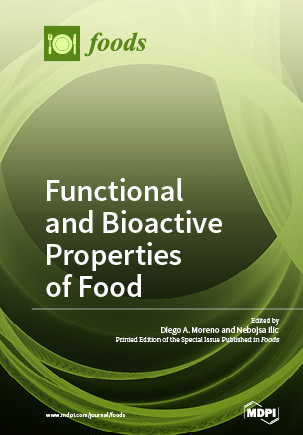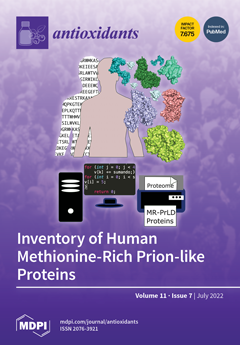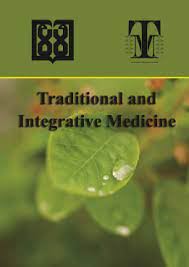Bee Pollen
How to submit an article:
- Registered users can submit any published journal article that has a unique DOI (Digital Object Identifier) name or link to Research Hub.
- For example, you can paste the full DOI link:
https://doi.org/10.1109/5.771073or just the DOI name:10.1109/5.771073into the field above and click submit. - The person who is first to submit a valid article to Research Hub will forever be credited for it, and every article submission earns you +6 Research Points.
Published research studies are articles that present the findings of original research that has undergone a peer-review process and has been made publicly available in scholarly journals, books or other media.

All That Glitters Is Not Gold: Assessment of Bee Pollen Supplementation Effects on Gastric Mucosa
2023 Dec 21 Nutrients Oszczędłowski P, Górecki K, Greluk A, Krawczyk M, Pacyna K, Kędzierawski JA, et al.
Bee pollen supplementation reduced the levels of COX-1 and elevated iNOS levels, while showing no significant impact on COX-2 levels, suggesting limited gastroprotective and anti-inflammatory effects on gastric mucosa.
Animal Study
Chemical Properties and Biological Activity of Bee Pollen
2023 Nov 25 Molecules Rodríguez-Pólit C, Gonzalez-Pastor R, Heredia-Moya J, Carrera-Pacheco SE, Castillo-Solis F, Vallejo-Imbaquingo R, et al.
Review ArticleBee pollen showcases a range of biological activities, such as anti-inflammatory, antimicrobial, and potential antiviral properties, which could contribute to the creation of innovative therapies.
Revolutionizing the Use of Honeybee Products in Healthcare: A Focused Review on Using Bee Pollen as a Potential Adjunct Material for Biomaterial Functionalization
2023 Jul 04 Journal of Functional Biomaterials Sanyal A, Ghosh A, Roy C, Mazumder I, Marrazzo P
The study concludes that incorporating bee pollen into biomaterials can enhance their biocompatibility and confer anti-inflammatory, antimicrobial, and antioxidant effects, which may have potential applications in tissue healing.
Review Article
Antiviral Activity of Beebread, Bee-Collected Pollen and Artificially Fermented Pollen against Influenza A Virus
2023 May 13 Foods Dimitriou T, Asoutis Didaras N, Barda C, Skopeliti D, Kontogianni K, Karatasou K, et al.
Experimental Study Influenza Antiviral Bee Pollen Honey Bee BreadBee-collected pollen and bee bread, particularly when artificially fermented, demonstrate significant antiviral activity against the H1N1 strain of the influenza A virus.

Bee Pollen as Functional Food: Insights into Its Composition and Therapeutic Properties
2023 Feb 23 Antioxidants El Ghouizi A, Bakour M, Laaroussi H, Ousaaid D, El Menyiy N, Hano C, et al.
The study concludes that bee pollen is a highly nutritious substance with a wide range of bioactive compounds and has potential therapeutic applications in the medical and food industries.
Review Article Bee PollenResearch insights are moderated by the Research Hub team and offer an at-a-glance overview of interesting research findings.

2023 Molecules
Bee pollen showcases a range of biological activities, such as anti-inflammatory, antimicrobial, and potential antiviral properties, which could contribute to the creation of innovative therapies.
Review Article
Chemical Properties and Biological Activity of Bee Pollen
Rodríguez-Pólit C, Gonzalez-Pastor R, Heredia-Moya J, Carrera-Pacheco SE, Castillo-Solis F, Vallejo-Imbaquingo R, et al.

2023 Foods
Bee-collected pollen and bee bread, particularly when artificially fermented, demonstrate significant antiviral activity against the H1N1 strain of the influenza A virus.
Experimental Study Antiviral Bee Bread Honey Influenza
Antiviral Activity of Beebread, Bee-Collected Pollen and Artificially Fermented Pollen against Influenza A Virus
Dimitriou T, Asoutis Didaras N, Barda C, Skopeliti D, Kontogianni K, Karatasou K, et al.

2022 Nutrients
Bee pollen, enriched with multiple nutrients, serves as a protective shield against a variety of ailments such as diabetes, allergies, and cancers, and potentially useful in cosmetic applications.
Review Article
Bee Pollen: Clinical Trials and Patent Applications
Algethami JS, El-Wahed AAA, Elashal MH, Ahmed HR, Elshafiey EH, Omar EM, et al.
2015 Molecular and Clinical Oncology
Bee pollen and honey may alleviate menopausal symptoms in breast cancer patients undergoing antihormonal treatment.
Randomised Controlled Trial
Bee pollen and honey for the alleviation of hot flushes and other menopausal symptoms in breast cancer patients
MÜNSTEDT KARSTEN, VOSS BENJAMIN, KULLMER UWE, SCHNEIDER URSULA, HÜBNER JUTTA
Review Articles
Review articles summarise and critically evaluate the current state of research on a specific topic or field by synthesising multiple primary research studies.

Chemical Properties and Biological Activity of Bee Pollen
2023 Nov 25 Molecules Rodríguez-Pólit C, Gonzalez-Pastor R, Heredia-Moya J, Carrera-Pacheco SE, Castillo-Solis F, Vallejo-Imbaquingo R, et al.
Review ArticleBee pollen showcases a range of biological activities, such as anti-inflammatory, antimicrobial, and potential antiviral properties, which could contribute to the creation of innovative therapies.
Revolutionizing the Use of Honeybee Products in Healthcare: A Focused Review on Using Bee Pollen as a Potential Adjunct Material for Biomaterial Functionalization
2023 Jul 04 Journal of Functional Biomaterials Sanyal A, Ghosh A, Roy C, Mazumder I, Marrazzo P
The study concludes that incorporating bee pollen into biomaterials can enhance their biocompatibility and confer anti-inflammatory, antimicrobial, and antioxidant effects, which may have potential applications in tissue healing.
Review Article
Bee Pollen as Functional Food: Insights into Its Composition and Therapeutic Properties
2023 Feb 23 Antioxidants El Ghouizi A, Bakour M, Laaroussi H, Ousaaid D, El Menyiy N, Hano C, et al.
The study concludes that bee pollen is a highly nutritious substance with a wide range of bioactive compounds and has potential therapeutic applications in the medical and food industries.
Review Article Bee Pollen
Bee Pollen: Clinical Trials and Patent Applications
2022 Jul 12 Nutrients Algethami JS, El-Wahed AAA, Elashal MH, Ahmed HR, Elshafiey EH, Omar EM, et al.
Review ArticleBee pollen, enriched with multiple nutrients, serves as a protective shield against a variety of ailments such as diabetes, allergies, and cancers, and potentially useful in cosmetic applications.

Honey Bee Products: Preclinical and Clinical Studies of Their Anti-inflammatory and Immunomodulatory Properties
2022 Jan 03 Frontiers in Nutrition El-Seedi HR, Eid N, Abd El-Wahed AA, Rateb ME, Afifi HS, Algethami AF, et al.
Bee products, including propolis, royal jelly, honey, bee venom, and bee pollen, show potential therapeutic effects in regulating inflammatory mediator production, improving immune response, and acting as anti-inflammatory, immune protective, antioxidant, anti-apoptotic, and antimicrobial agents.
Review ArticleClinical Trials
Clinical trials are research studies that involve people and are conducted to evaluate the safety and efficacy of new treatments or interventions, such as drugs, medical devices, or behavioural therapies.

N-Chromosome Royal Jelly, Propolis and Bee Pollen Supplementation Improve the Clinical Conditions of COVID-19 Patients: A Randomized Controlled Trial
2022 Jan 08 Traditional and Integrative Medicine Abedini A, Shafaghi S, Ameri Ahmad Z, Javanmardi E, Ghorbani F, Sharif-Kashani B, et al.
In a randomized, open-label, controlled trial involving 50 cases of COVID-19, the intervention group receiving royal jelly, propolis, and bee pollen in addition to conventional treatment showed a more pronounced improvement in functional class compared to the control group. Additionally, the intervention group experienced significantly reduced total symptoms duration and time to return to work. Although these natural supplements are not definitive treatments for COVID-19, they can be considered as adjuvant treatments to limit disease symptoms and virus propagation.
Randomised Controlled Trial COVID-19 Bee PollenBee pollen and honey for the alleviation of hot flushes and other menopausal symptoms in breast cancer patients
2015 May 04 Molecular and Clinical Oncology MÜNSTEDT KARSTEN, VOSS BENJAMIN, KULLMER UWE, SCHNEIDER URSULA, HÜBNER JUTTA
Randomised Controlled Trial Bee PollenBee pollen and honey may alleviate menopausal symptoms in breast cancer patients undergoing antihormonal treatment.
Study Protocols
Published study protocols are detailed plans that outline the objectives, methodology, statistical analyses, and organisation of a research study that have been made publicly available for others to review and use as a reference.
Presentation Slides

Review Article
Bee pollen showcases a range of biological activities, such as anti-inflammatory, antimicrobial, and potential antiviral properties, which could contribute to the creation of innovative therapies.
Rodríguez-Pólit C, Gonzalez-Pastor R, Heredia-Moya J, Carrera-Pacheco SE, Castillo-Solis F, Vallejo-Imbaquingo R, Barba-Ostria C, Guamán LP

Experimental Study
Bee-collected pollen and bee bread, particularly when artificially fermented, demonstrate significant antiviral activity against the H1N1 strain of the influenza A virus.
Dimitriou T, Asoutis Didaras N, Barda C, Skopeliti D, Kontogianni K, Karatasou K, Skaltsa H, Mossialos D

Review Article
Bee pollen, enriched with multiple nutrients, serves as a protective shield against a variety of ailments such as diabetes, allergies, and cancers, and potentially useful in cosmetic applications.
Algethami JS, El-Wahed AAA, Elashal MH, Ahmed HR, Elshafiey EH, Omar EM, Naggar YA, Algethami AF, Shou Q, Alsharif SM, Xu B, Shehata AA, Guo Z, Khalifa SAM, Wang K, El-Seedi HR

Randomised Controlled Trial
Bee pollen and honey may alleviate menopausal symptoms in breast cancer patients undergoing antihormonal treatment.
MÜNSTEDT KARSTEN, VOSS BENJAMIN, KULLMER UWE, SCHNEIDER URSULA, HÜBNER JUTTA
Executive Summary
Write an executive summary in the form of a blog article on the topic of "Research into Chinese medicine treatment for Bee Pollen" summarising the research below and using language that can be easily understood by patients and avoiding medical jargon using a professional and caring tone of voice.
Write an executive summary in the form of a blog article on the topic of "Researched Chinese medicine treatments for Bee Pollen" summarising the research below in an objective and easy to understand way, and using language that can be easily understood by patients. Group the article into Chinese medicine treatments first, followed by nutrition and other treatments. Avoid using medical jargon and use a professional and caring tone of voice.
Write me a concise but easy to understand executive summary on the topic of "Chinese medicine treatments for Bee Pollen" based on the following research that I will give you. Your summary should be 2 paragraphs long in Australian English spelling and include references to the studies.
A Review Article published in 2023 in the journal Molecules found that Bee pollen showcases a range of biological activities, such as anti-inflammatory, antimicrobial, and potential antiviral properties, which could contribute to the creation of innovative therapies. The methodology used in the study involved analysing a diverse array of pollen types, in combination with their various chemical compositions. The primary aim of this was to updatedly assess the bioactive constituents present in bee pollen and consider the therapeutic possibilities they present. A focus of the study was on beehive pollen since it is a rich natural source of proteins and nutrients and exhibits immense chemical and therapeutic potential. Discussion of results emphasized that the range of biological activities associated with bee pollen is truly remarkable. This activity ranges from anti-inflammatory and antimicrobial properties to potential antiviral and anticancer applications. Despite the challenge presented in fully understanding the vast array of biological properties across various pollen sources, this study has succeeded in emphasizing the potential extent of the therapeutic effectiveness of bee pollen. Its potential contribution on the path to discovering innovative therapies cannot be underestimated.
A Experimental Study published in 2023 in the journal Foods found that Bee-collected pollen and bee bread, particularly when artificially fermented, demonstrate significant antiviral activity against the H1N1 strain of the influenza A virus. The research investigated the antiviral properties of bee-collected pollen (BCP) and bee bread (BB), including versions that had undergone artificial fermentation. The experiment also assessed separate proteins, water content, and -butanol portions of these substances. The analysis evaluated their effectiveness against the H1N1 strain of the influenza A virus (IAV). The antiviral behavior of these materials was taken in lab conditions via a comparative real-time PCR analysis working on their inhibitory concentration and selectivity index. The outcomes revealed artificial fermentation improved the antiviral effectiveness of BCP. The protein fractions within the BCP and BB presented the greatest antiviral activity. Observations also highlighted that the chemical composition, prominent in proteins, and potentially microbiome metabolism determined the antiviral properties of BCP and BB. The chemical profile analysis emphasized the existence of some specialized metabolites that might be contributing towards this antiviral action.
A Review Article published in 2022 in the journal Nutrients found that Bee pollen, enriched with multiple nutrients, serves as a protective shield against a variety of ailments such as diabetes, allergies, and cancers, and potentially useful in cosmetic applications. The methodology employed involved a detailed review of clinical trials and patents related to the use of bee pollen. The researchers critically analyzed cases where bee pollen has been applied, particularly focusing on its use in treating allergies, prostate illnesses, cancer, and skin issues. Insights were also gained from the various patents and health recipes that utilize bee pollen to treat chronic health problems. In discussion of the results, it was found that bee pollen stands out for its multiple health benefits. Its impressive nutritional profile makes it a strong agent against diseases like diabetes, cancer, and cardiovascular conditions. Furthermore, the research indicated that bee pollen could be effectively utilized as a supplementary food given its nutrient richness. It was also observed that bee pollen holds a significant potential for usage in cosmetic applications, posing it as a natural and cost-effective choice for skincare and beauty industry.
A Randomised Controlled Trial published in 2015 in the journal Molecular and Clinical Oncology found that Bee pollen and honey may alleviate menopausal symptoms in breast cancer patients undergoing antihormonal treatment. The study used a prospective, randomized crossover trial to compare the effects of a pollen-honey mixture with pure honey in alleviating menopausal symptoms in breast cancer patients undergoing antihormonal treatment. The patients' symptoms were measured using the Menopause Rating Scale. The results showed that a significant number of patients reported improvement in their menopausal symptoms while taking both honey and the pollen-honey mixture. Interestingly, honey, originally intended as a placebo, had similar effectiveness as the pollen in easing symptoms, with both exceeding the expected placebo effect. From these findings, the researchers concluded that bee pollen and honey could be potential aids in managing menopausal symptoms in breast cancer patients on antihormonal therapy.
Moderation Tools
Topic
Sign In
Users not signed in are limited to viewing the 5 most recent items of content.